
In many classrooms there are learners who have difficulty with planning and carrying out movements. These learners may have motor coordination skills and balance difficulties, also known as developmental coordination disorder or dyspraxia. Children and young people with dyspraxia may seem clumsy or accident prone. They may have difficulties with fine motor skills, such as writing, or gross motor skills, such as running. Living with MCD can be very challenging especially if there is a co-occurring need such as speech and language difficulties, challenging behaviours and accurate word reading and spelling difficulties.
The course content relates to learners in compulsory education (4-18 years), however, the theory and many of the assessment and intervention strategies can be contextualised and implemented in an early years setting too. You will learn how to assess the needs of a learner and go on to develop a support plan consisting of SMART goals and interventions, which you will implement and later review to determine how well it has met the learner’s specific developmental needs.
This course responds to the information needs of the whole community centred around supporting the child/young person with motor coordination difficulties. Parents and carers benefit from raised awareness of their child’s needs. Advisory teachers, therapists and educational psychologists gain access to evidence-based CPD resources that can be used to strengthen capacity in their local authority and schools. Schools can use this course to train individuals or groups of teachers and teaching support staff as part of a school’s improvement plan or a whole-school initiative. NQTs/RQTs also build a secure knowledge of the graduated approach at the start of their career.
Our courses are structured into four sections. Click on the section headings to reveal page titles and some example content.
Learn about the characteristics and range of impairments associated with motor coordination difficulties and experience the difficulties learners can have in planning and carrying out movement.
- Section objectives
- Understanding motor coordination difficulties
- Motor skills
- Definitions and terminology
- What else has it been called? Clumsy child syndrome…
- Praxis - the basis of action, ideation, motor planning, execution, feedback
- What is praxis?
-
How do motor learning difficulties happen?
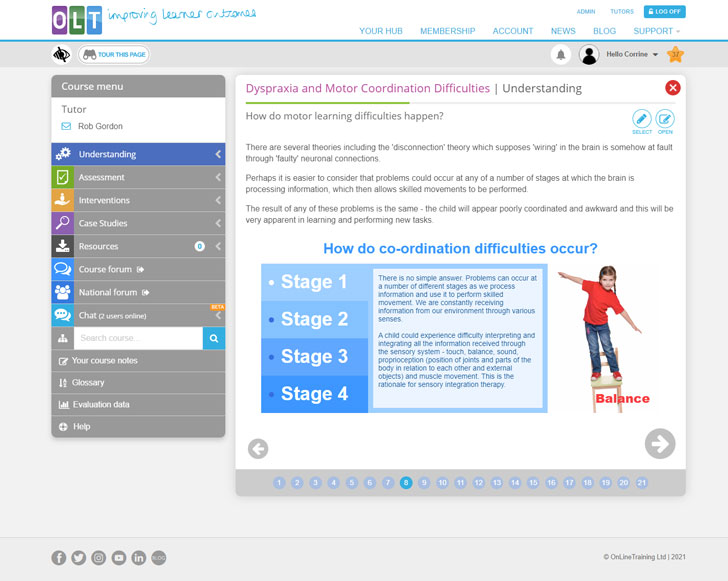
Screenshot from Understanding page 8 - Who is affected?
- Characteristic features
- Physical characteristics
-
Dressing / undressing
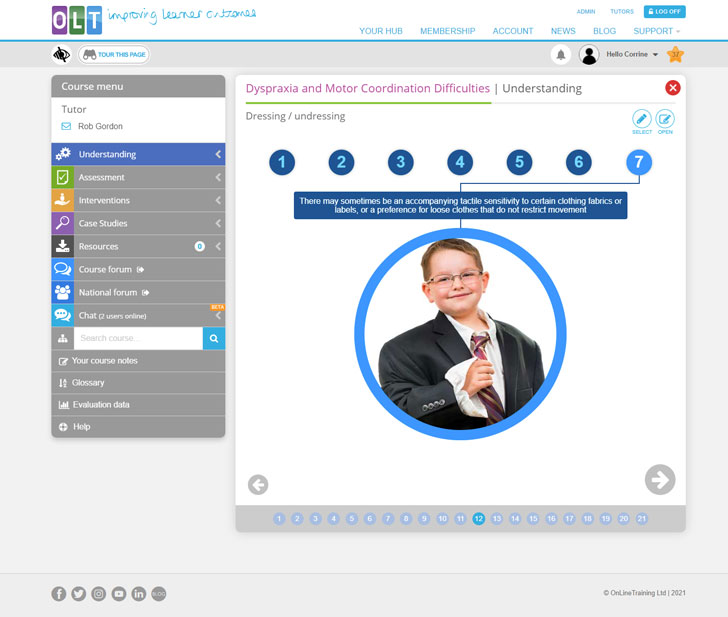
Screenshot from Understanding page 12 - Feeding and eating
- Handwriting
- Emotional and behavioural characteristics
- Other characteristics
- Popular misconceptions
- Medical causes or motor coordination problems
- Why do anything about it?
- End of section quiz
- Section summary
Explore the main types and purposes of assessment, and use checklists to carry out observations. Understand how and when to refer children to multi-professional teams for motor assessment.
- Section objectives and your learner’s profile
- What is assessment?
- Types of assessment
- The role of professionals in assessment
-
The role of the teacher in assessment
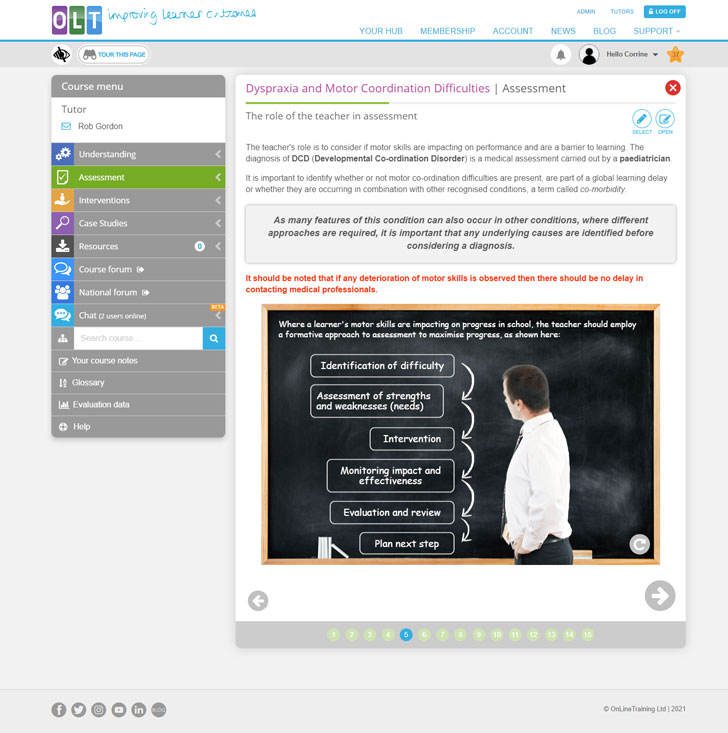
Screenshot from Assessment page 5 - Effective assessment for learning
- A developmental approach
- Expected developmental milestones
- Checklists
- Other difficulties
- Course assignment: Your learner’s three SMART goals
-
Assessment record form
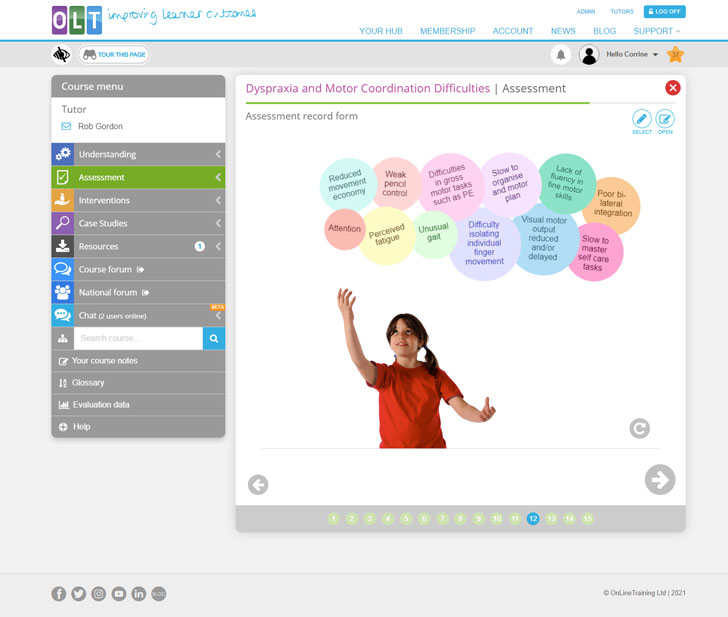
Screenshot from Assessment page 12 - Voice of the child
- End of section quiz
- Section summary
Learn strategies to enable learners to build and master motor skills and understand how to modify tasks and the classroom environment to help them succeed.
- Section objectives
- Introduction
- The acquisition of motor skills
- Teaching motor skills
-
Fine motor skills – getting seating posture right
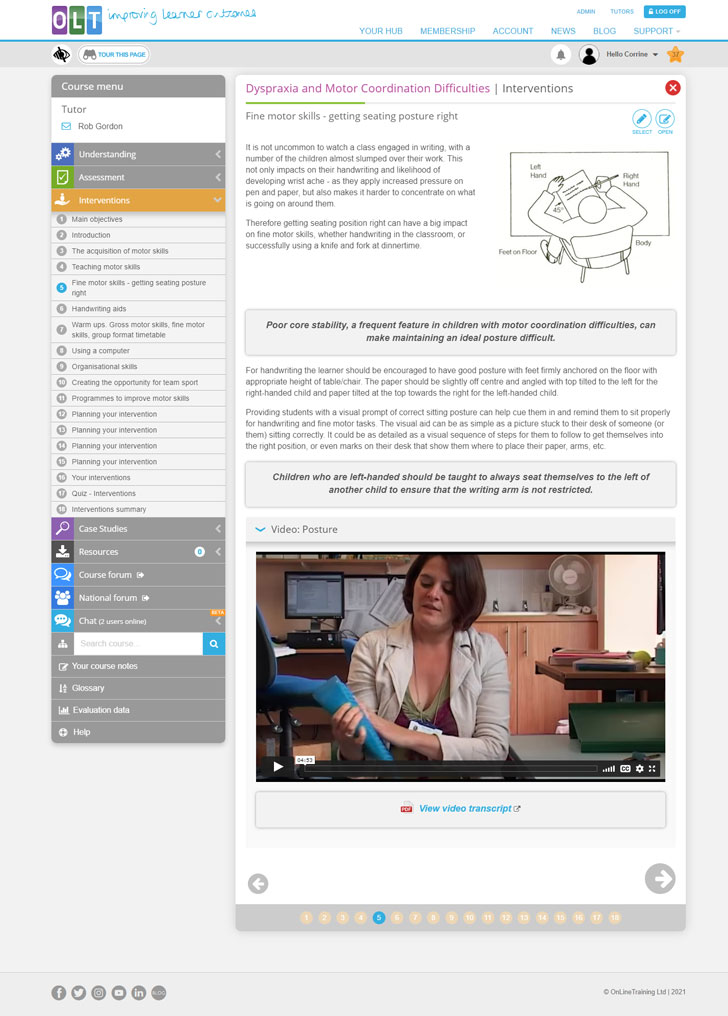
Screenshot from Interventions page 5 - Handwriting aids
- Warms ups. Gross motor skills, fine motor skills, group format timetable
- Using a computer
- Organisational skills
- Creating the opportunity for team sport
- Programmes to improve motor skills
- Planning your intervention (Part 1)
- Planning your intervention (Part 2)
-
Planning your intervention (Part 3)
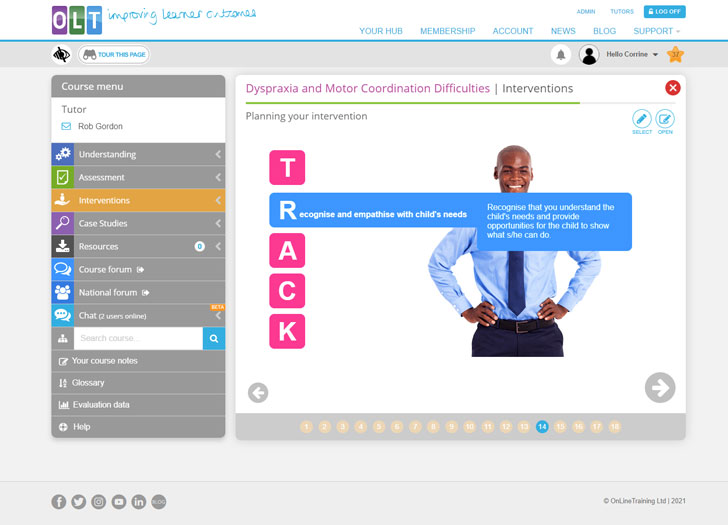
Screenshot from Interventions page 14 - Planning your intervention (Part 4)
- Course assignment: Your learner’s three interventions
- End of section quiz
- Section summary
View real examples that illustrate the needs of the individual, the interventions implemented and their resulting progress.
- Case study: Storrington First School
- Case study: Nightingales Clinic
- Case study: Summerlea
Qualified Teacher
Teaching Assistant
Teaching Assistant
Teaching Assistant
Teaching Assistant
Other Position
Other Position
Other Position
Teaching Assistant
Teaching Assistant
Advisory Teacher
Course learning outcomes
On successful completion of the course, you will be able to:
- recognise and describe the main features of motor learning difficulties
- describe, using correct terminology, the difficulties learners can have in planning and carrying out movement
- identify the characteristics and range of impairments associated with motor coordination difficulties
- refer children for motor assessment to the appropriate multi-professional teams
- use checklists to carry out observations of a child’s motor skills
- apply a graduated response to meeting the needs of learners with motor difficulties using the assess, plan, do review cycle
- employ strategies that enable learners to build and master motor skills
- modify tasks, alter expectations and change the classroom environment to help learners meet with success
- make reasonable adjustments in social and sporting activities to maximise the inclusion of learners with motor difficulties
- create a support plan for a pupil/group of pupils in your school

